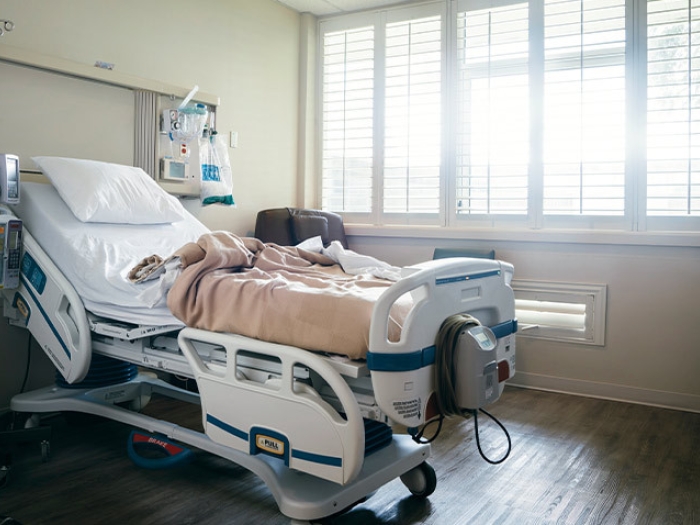Michigan’s new coverage for low-income adults has helped many patients better manage their health by mandating primary care visits, a new study finds.
7:00 AM
Author |

Extending medical insurance to low-income Michigan residents meant better access to health care, earlier detection of serious illnesses, better care for existing health problems and improved ability to work, attend school and live independently, according to a new survey of primary care providers.
LISTEN UP: Add the new Michigan Medicine News Break to your Alexa-enabled device, or subscribe to our daily audio updates on iTunes, Google Play and Stitcher.
Part of the reason for that success? A preventive measure that allows Michigan to require new Medicaid expansion participants to see a primary care provider within months of enrolling and work with that provider to assess their health risks.
Published in the Journal of General Internal Medicine by a team from the University of Michigan Institute for Healthcare Policy and Innovation, the results come from 2,104 primary care doctors, nurse practitioners and physician assistants who care for 12 or more people insured by the Healthy Michigan Plan, Michigan's expansion of the Medicaid insurance program to low-income adults.
The institute's researchers carried out the survey as part of a contract with the Michigan Department of Health and Human Services to conduct the formal evaluation of the Healthy Michigan Plan required by the federal waiver that allowed Michigan to customize its Medicaid expansion.
The new findings suggest that requiring primary care visits as part of enrollment could provide a model for other states considering expanding Medicaid — or those working to expand it under recent policy decisions, researchers note.
"While Michigan's Medicaid expansion has been looked at as an example of financial incentives for healthy behavior, I think the primary care part of it is an underappreciated strength," says Susan Goold, M.D., M.A., M.H.S.A., the professor of internal medicine who led the study.
"Primary care practitioners said that people gained access to care they didn't have before, including preventive services, and care for chronic conditions and other problems that they might otherwise have ended up in the emergency department for."
Benefits of coverage
One year after Medicaid expansion took effect in Michigan, the survey of primary care providers about their previously uninsured patients found:
-
74 percent said Healthy Michigan Plan coverage had a positive impact on patients who have chronic diseases such as diabetes, asthma, heart disease and arthritis.
-
71 percent said the coverage had led to earlier detection of serious illnesses in patients who had not previously been diagnosed; earlier detection can improve outcomes and reduce overall costs of care.
-
69 percent said patients had stuck to their medication better because of their new insurance coverage; adherence to prescribed medicines can improve health outcomes
-
56.5 percent said their patients had improved their health-related behaviors. The Healthy Michigan Plan offers incentives such as gift cards and discounts to encourage participants to stop smoking, exercise more and engage in other healthy behaviors.
-
57 percent said coverage had positively affected their patients' emotional well-being.
-
46 percent said coverage had improved their patients' ability to work or attend school.
-
41 percent said patients' ability to live independently had improved because of their coverage.
In addition to its impact on patients, the survey showed that the Healthy Michigan Plan had a major impact on primary care providers' own practices. For example:
-
56.2 percent reported an increase in patients who were seeing a doctor or other health care provider for the first time in years.
-
57 percent had hired additional office staff, and 53 percent had hired additional clinicians
-
Nearly 56 percent said they had consulted with a professional who specializes in connecting high-need and underserved people to care and social services, either a case manager, a care coordinator or a community health worker.
-
52.3 percent said they'd seen an increase in their number of new patients.
-
Nearly 51 percent said patients they'd seen before who had lacked insurance or paid directly for their care had gained insurance.
-
15 percent said their primary care site had begun offering mental health services.
-
Just under 16 percent said their existing patients had experienced a decrease in their ability to get a same-day or next-day appointment because of the increase in patients covered by the Healthy Michigan Plan.
Enthusiasm runs statewide
Before designing the survey, the researchers conducted in-depth interviews with a sample of primary care providers from across the state. Their paper contains anonymous quotes from the interviews.
MORE FROM THE LAB: Subscribe to our weekly newsletter
More than 77 percent of the providers who returned the survey were either family practice or general internal medicine physicians; 17 percent were nurse practitioners or physician assistants, who can provide a full range of primary care services when working with a supervising physician under Michigan law.
Rural and Upper Peninsula providers were overrepresented in the survey, though three-quarters of respondents practiced in an urban setting and 31 percent were in the Detroit metropolitan region.
Support of the primary care requirement appears to span geography and medical specialty.
"According to primary care providers, it's working — it's getting patients in the door so providers can talk to them about what they need to do to stay or get healthy," says Goold, who also has a faculty appointment in the U-M School of Public Health. "I do think that other states can learn from our example."

Explore a variety of health care news & stories by visiting the Health Lab home page for more articles.

Department of Communication at Michigan Medicine
Want top health & research news weekly? Sign up for Health Lab’s newsletters today!





